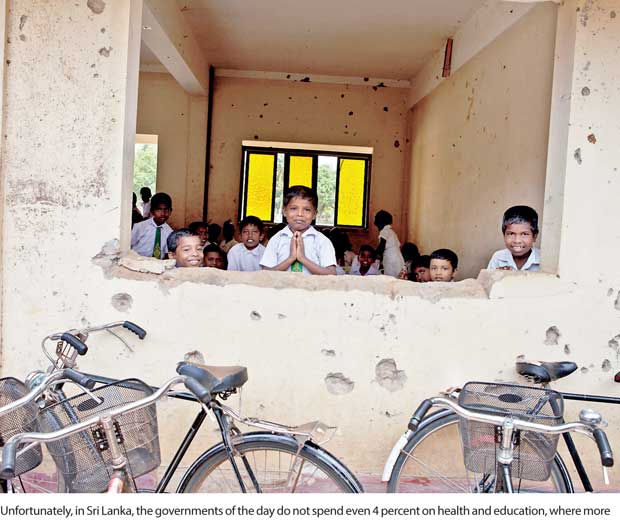30 Jan 2018 - {{hitsCtrl.values.hits}}

 We preach that Sri Lanka is a Democratic Socialist Republic and practice social market economy. One of the measures to see the role of government in the social sector is to look at the total tax collection from the rich and the subsidies afforded to the less privileged people in society.
We preach that Sri Lanka is a Democratic Socialist Republic and practice social market economy. One of the measures to see the role of government in the social sector is to look at the total tax collection from the rich and the subsidies afforded to the less privileged people in society.
The rich countries’ tax collection is around 45 percent to 50 percent of gross domestic product (GDP) and they in turn invest 12 percent to 18 percent on health and education, whereas in Sri Lanka, our tax revenue is around 13 percent to 15 percent and how much do we spend on education and health?
Health and education services fast deteriorating
The growing tax collection has enabled the developed countries (the US, Britain, France and Sweden) to take on social welfare functions. A major portion goes to health and education. The spending on education and health accounts for 12 percent to 18 percent of the national income in all the developed countries today.
In all the developed countries, public spending covers much of the cost of education and health services: the goal is to give equal access to these basic goods: every child should have access to education, regardless of his or her parents’ income and everyone should have access to healthcare.
Unfortunately, in Sri Lanka, the governments of the day do not spend even 4 percent on health and education, where more than 25 percent of our people live below the poverty line. In fact, there has been a reduction in the capital expenditure on health during the last two to four years. Our health and education services are fast deteriorating to a level where we could end up in having unhealthy and less educated children similar to the population living in the least developed countries.
Economic power is shifting from West to Asia
The balance of economic power is shifting from West to Asia, with China, Japan, South Korea, India and many other East/South Asian economies leading the global economic recovery. The World Bank forecasts global economic growth of 3 percent in 2018 and the growth in the so-called advanced economies is expected to be around only 2 percent in 2018. The economic growth in the emerging markets is projected to strengthen around 4.5 percent in 2018.
It is a pity that according to the latest reports of the World Bank, the projected growth rates even for South Asian countries (India, Bangladesh and Pakistan, etc.) during the next two to three years are around 6.8 percent to 7.2 percent, whereas the Sri Lankan growth figures are much lower and currently it’s around 4 percent.
Sri Lanka continues to rely on Western markets for our export earnings. The bulk of the Sri Lankan exports (60 percent) have been to the US and EU. As seen above, the Asian growth champions – China, Vietnam, South Korea and India – will perform much better. China and India are predicted to grow at an impressive 6.4 and 7.3 percent, respectively.
Overcoming implementation snags
As for national policymaking, in earlier days, most of the researchers focused on the successful strategy formulation. However, in the recent years’ studies, attention has shifted towards the successful strategic plan ‘implementation’.
It is interesting to find out as to why our government ministries and institutions fail in implementation? The answer narrows downs to one single entity, which is non-other the government machinery itself. The answers are simple and well known, yet no light at the tunnel of effective delivery.
In my view, the present implementation snags in the Sri Lankan government policymaking process are mainly due to the following issues: (1) lack of a ‘shared value system’ and work ethic culture, (2) policy inconsistencies, incongruities and lack of clarity on the specific policy, (3) policies drawn without due consideration of geo-political realities and environmental factors, (4) the specific policy change may not be acceptable to influencing stakeholders, (5) process of policy change has been perceived by majority stakeholders as not transparent, (6) undue private sector lobbies creating confusion in decision-making and (7) trade union views are not sought at the beginning itself.
Becoming ungovernable
In Sri Lanka, corruption and mismanagement have reached such proportions that the young electorate, especially the millennials viewed political leaders with suspicion. They are really fed up with all the political parties including those in the government as well as in the opposition.
The successive governments have failed in bringing social justice and much-needed economic welfare to the people. Consequently, the income inequality and social unrest are fast spreading across the regions, sub-districts and cities.
Most of the top business leaders and professionals are of the view that the quality of life of not only the poor, even the middle class is drastically declining. The immediate future scenario would be that more and more people would become dissatisfied with the government machinery. This will lead to social unrest, which makes the system ungovernable.
Evidence-based policies and crafting winning strategies
The writer is of the view that in the past, the leaders of the political parties, who aspire to become the policymakers in the next government that they are going to form, used to engage in drafting ‘party manifestos’ in a hurry without due consideration of ‘evidence-based policy shaping’ and come out with some practical and implementable strategies, thus focussing on achieving long-term sustainable development goals as a whole. It is in this context only the policy shaping and future strategic directions for the Sri Lankan economy should be viewed and practiced.
Sri Lanka is yet to effectively ‘plug in’ to the dynamic growth centres that are emerging in Asia. According to former Defence Secretary Gotabaya Rajapaksa, this is one of the priority areas for further studies for policy shaping, if we are to fast track development initiatives to improve the economic welfare of the people of this country.
In this connection, it is very important to analyse and find out the industries and businesses in Sri Lanka that have a ‘competitive advantage’ to penetrate into these emerging markets. We also need to find out whether there are any skill gaps in the ‘human resource’ needs to further improve the competitiveness of the industries.
Conclusion
Time is opportune for the professionals, academics and business leaders to come forward and critically review the national policies and programmes and its implementation. My own view is that we must have ‘brainstorming sessions’ inviting a cross section of people and the concerned professionals and craft ‘winning strategies’ for Sri Lanka, based on evidence and lessons learnt (by studying benchmark best practices, past experiences, etc.) without any fixed ideologies linked to petty party politics and its affiliations. ‘Politics’ is too good to be left out to conventional politicians only.
(Jayampathy Molligoda is a Fellow Member of the Institute of Chartered Accountants of Sri Lanka. He has obtained his MBA from the Postgraduate Institute of Management and has also successfully completed an Executive Strategy Programme at Victoria University Melbourne, Australia. He counts over 37 years of executive experience in the fields of financial management, strategic planning and human resource development. At present, he serves as Executive Deputy Chairman of a leading public quoted company. He can be reached at [email protected])
10 Jan 2025 28 minute ago
10 Jan 2025 2 hours ago
10 Jan 2025 2 hours ago
10 Jan 2025 4 hours ago
10 Jan 2025 4 hours ago